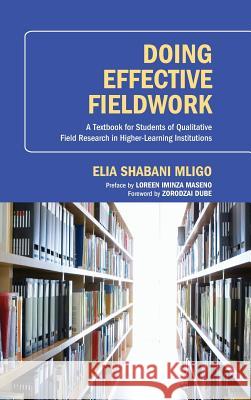Doing Effective Fieldwork » książka
Doing Effective Fieldwork
ISBN-13: 9781498266284 / Angielski / Twarda / 2013 / 184 str.
Doing Effective Fieldwork
ISBN-13: 9781498266284 / Angielski / Twarda / 2013 / 184 str.
(netto: 157,81 VAT: 5%)
Najniższa cena z 30 dni: 163,44
ok. 16-18 dni roboczych.
Darmowa dostawa!
Description: We live in a context of change, whereby postmodernity shapes our understanding and our searching for truth. Postmodernity dictates not only what kind of results we obtain in our researches, but also on the ways we use to search for truth. This means that postmodernity dictates the ways we do research in various disciplines, the ways we use to analyze the research results, and the ways we use to communicate the findings. Postmodernity is the paradigm in which we are greatly concerned. What is the place of rules of research, research ethics, selection of the problem, and designing of research as we consider the context whereby nothing absolute can be envisaged? How should one review the literature to suit this postmodern understanding of reality? How should one argue his or her case? This book is designed to help students in higher learning institutions learn qualitative research methods in classrooms or by themselves. It moves students and researchers from modern ways of understanding, doing, and communicating qualitative research towards postmodern challenges and promises. In this case, the book is worthy reading to every serious student and researcher who seeks to equip oneself to the current issues of qualitative research methodology. Endorsements: ""Elia Shabani Mligo's book is long overdue. By producing such mammoth work, Mligo challenges the academic community of the centrality of research in the production of knowledge and the development of society. I strongly guarantee this book to be one of the primary texts for researchers and scholars at both college and university levels."" --from the Foreword by Zorodzai Dube University of South Africa Pretoria, South Africa About the Contributor(s): Elia Shabani Mligo (PhD, University of Oslo, Norway) teaches Theology and Research at Amani University Project in Njombe, an institution that operates under Iringa University College of Tumaini University Makumira. He is the author of Jesus and the Stigmatized (2011) and Writing Academic Papers (2012).
Description:We live in a context of change, whereby postmodernity shapes our understanding and our searching for truth. Postmodernity dictates not only what kind of results we obtain in our researches, but also on the ways we use to search for truth. This means that postmodernity dictates the ways we do research in various disciplines, the ways we use to analyze the research results, and the ways we use to communicate the findings. Postmodernity is the paradigm in which we are greatly concerned. What is the place of rules of research, research ethics, selection of the problem, and designing of research as we consider the context whereby nothing absolute can be envisaged? How should one review the literature to suit this postmodern understanding of reality? How should one argue his or her case? This book is designed to help students in higher learning institutions learn qualitative research methods in classrooms or by themselves. It moves students and researchers from modern ways of understanding, doing, and communicating qualitative research towards postmodern challenges and promises. In this case, the book is worthy reading to every serious student and researcher who seeks to equip oneself to the current issues of qualitative research methodology.Endorsements:""Elia Shabani Mligos book is long overdue. By producing such mammoth work, Mligo challenges the academic community of the centrality of research in the production of knowledge and the development of society. I strongly guarantee this book to be one of the primary texts for researchers and scholars at both college and university levels.""--from the Foreword by Zorodzai DubeUniversity of South AfricaPretoria, South AfricaAbout the Contributor(s):Elia Shabani Mligo (PhD, University of Oslo, Norway) teaches Theology and Research at Amani University Project in Njombe, an institution that operates under Iringa University College of Tumaini University Makumira. He is the author of Jesus and the Stigmatized (2011) and Writing Academic Papers (2012).











